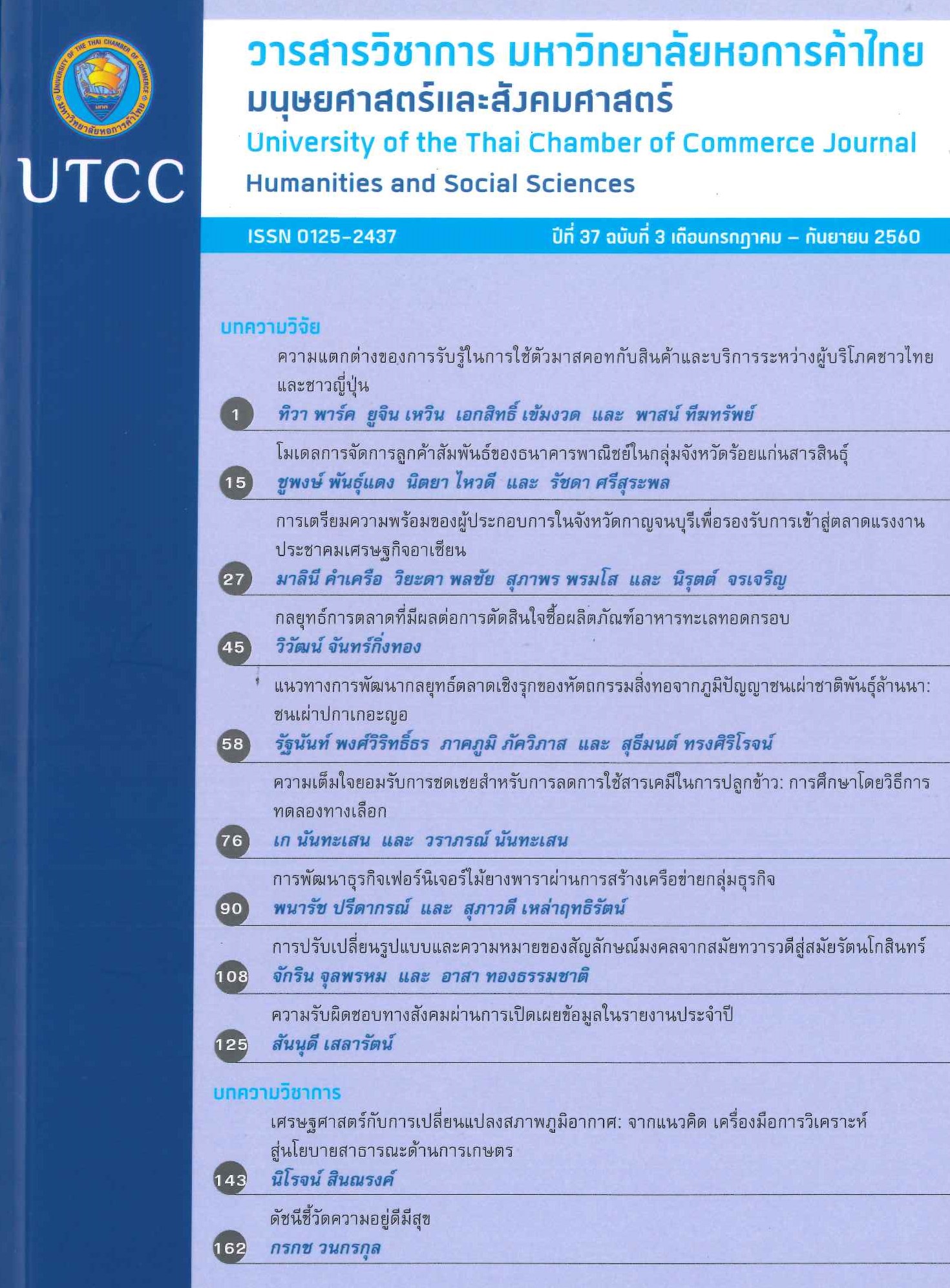Economics and Climate Change: From Concept and Analytical Tools to Public Policy in Agriculture
Main Article Content
Abstract
Climate change is a key issue in socio-economic development, which gains attention globally, particularly in agricultural economic planning and development for economic, social, and environment balance and sustainability. This article aims to review crucial concepts embracing climate change, econometrics tools for studying the effect of climate change on agricultural production, and agricultural public policy frameworks. Evidences show that applied econometrics is a tool for studying the effect of climate change agricultural production that provides empirical information for agricultural policy planning. Policy frameworks have to cover the awareness of weather variables and agricultural production, the reduction of greenhouse gas emission, and the adaptation to mitigate the impact of future climate change. These require cooperation of all stakeholders in the society, ranging from national to local levels, in order for adaptations to be posed as core components of sustainable agricultural development strategy within the context of climate change.
Article Details
ลิขสิทธิ์ของบทความ
ผลงานที่ได้รับการตีพิมพ์ถือเป็นลิขสิทธิ์ของมหาวิทยาลัยหอการค้าไทย ห้ามมิให้นำเนื้อหา ทัศนะ หรือข้อคิดเห็นใด ๆ ของผลงานไปทำซ้ำ ดัดแปลง หรือเผยแพร่ ไม่ว่าทั้งหมดหรือบางส่วนโดยไม่ได้รับอนุญาตเป็นลายลักษณ์อักษรจากมหาวิทยาลัยหอการค้าไทยก่อน
References
Antle, J.M. (2010). Asymmetry, partial moments, and production risk. American Journal of Agricultural Economics, 92(5), 1294-1309.
Asian Development Bank.(2009).Economics of climate change in Southeast Asia:A regional review. Manila, Philippines: Author.
Buddhaboon, C., Kongton, S., & Jintrawet, A.(2005). Climate scenario verification and impact on rain- fed rice production: The study of future climate changes impact on water resource and rain-fed agriculture production. In proceedings of the APN CAPable CB-01 synthesis workshop (pp.51-78). Bangkok, Thailand: Southeast Asia START Regional Center.
Cabas, J., Weersink, A., & Olale, E.(2010). Crop yield response to economic, site and climatic variables. Climatic Change,101(3-4), 559-616.
Chareinkitjarukorn, P.(2013). Green productivity and sustainability reporting guidelines.University of the Thai Chamber of Commerce Journal, 33(1), 189-214.(in Thai).
Chen, C.C., McCarl, B.A., & Schimmelpfennig, D.E.(2004). Yield variability as influenced by climate: A statistical investigation.Climatic Change, 66(1-2), 239-261.
Chithaisong, A.(2010). Thailand climate change information: Vol. 2. Bangkok,Thailand:Thailand Research Fund. (in Thai).
Demeke, A.B., Keil, A., & Zeller, M.(2011).Using panel data to estimate the effect of rainfall shocks on smallholders food security and vulnerability in rural Ethiopia. Climatic Change, 108(1-2), 185-206.
Di Falco, S.,& Chavas, J.P. (2009). crop biodiversity, risk exposure, and food security in the highlands of Ethiopia. American Journal of Agricultural Economics, 91(3), 599-611.
Intergovernmental Panel on Climate change 2007: Synthesis report. Geneva, Switzerland: Author.
Intergovernmental Panel on Climate change 2014: Synthesis report. Geneva, Switzerland: Author.
Isik, M.,& Devadoss, S.(2006). An analysis of the impact of climate change on crop yields and yield variability. Applied Economics, 38(7), 835-844.
Isvilanoda,S., Pranitwattakul, S., & Kumwong, C. (2009). Economic impact assessment of climate change on rice production in Thailand. Bangkok, Thailand: Thailand Research Fund. (in Thai).
Jones, A.D. (2011). An analysis of stochastic maize production functions (Unpublished master's thesis). University of Arkansas.
Judge, G.G., Griffiths, W.E., Hill, R.C.,LÜtkepohl, H., & Lee, T.-C.(1985). The theory and practice of econometrics. (2nd ed.). New York, NY:Wiley.
Just, R.E., & Pope, R.D. (1979). Production function estimation and related risk considerations. American Journal of Agricultural Economics, 61(2), 276-284.
Keeranan, T. (1981). Applied regression analysis for empirical research. Retrieved May 25,2016, from http://www.econ.chula.ac.th/public/publication/dp/1981/dp2407.pdf( in Thai)
Kerdreuang, A. (2015). Cost-effectiveness analysis for public policy evaluation. University of the Thai Chamber of Commerce Journal, 35(2), 174- 184. (in Thai).
Kongthon, S., Sornrawat, W., & Rattanasriwong, S. (2004). Impacts of global warming on rice, sugarcane, cassava, and maize production in Northeast Thailand: A study of Khonkan Province. Retrieved June10, 2016, from http://www.seaclimatechange.org/Content/Document/Paper_T/SEA%20START%20RC_Doc_001T_2004.pdf (in Thai).
Lasco, R.D., Habito, C.M.D., Delfino, R.J.P., Pulhin, F.B., & Concepcion, R.N. (2011). Climate change adaptation for smallholder farmers in Southeast Asia. Manila, Philippines: World Agroforestry Centre.
Matthews, R.B., Kropff, M.J., Horie, T., & Bachelet, D. 1997. Simulating the Impact of climate change on rice production in Asia and evaluation option for adaptation. Agricultural Systems, 54 (3), 399-425.
McCarl, B.A., Villavicencio, X., & Wu, X. 2008. Climate change and future analysis: Is stationarity dying? American Journal of Agricultural Economics, 90(5),1241-1247.
Office of Natural Resources and Environmental Policy and Planning. (2010). National master plan on climate change 2010-2019. Bangkok, Thailand: Author.(in Thai).
Pannangpetch,K., Sarawat, V., Boonpradub, S.,S., ...Damrikhemtrakul, W.(2009). Impacts of global warming on rice, sugarcane,Thailand. Bangkok, Thailand: Thailand Research Fund. (in Thai).
Saha, A., Havenner, A., & Talpaz, H. (1997). Stochastic production estimation: Small sample properties of MLE Versus FGLS. Applied Economics 29: 459-469.
Selvaraju, R., Gommes, R., & Bernadi, M. (2011). Climate science in support of sustainable agriculture and food security. Climate Research, 47(1-2), 95-110.
Shankar, B., Bennett, R., & Morse, S. (2007). Output risk aspects of geneticaly modified crop technology in South Africa. Economics of Innovation and New Technology, 16(4), 277-291.


